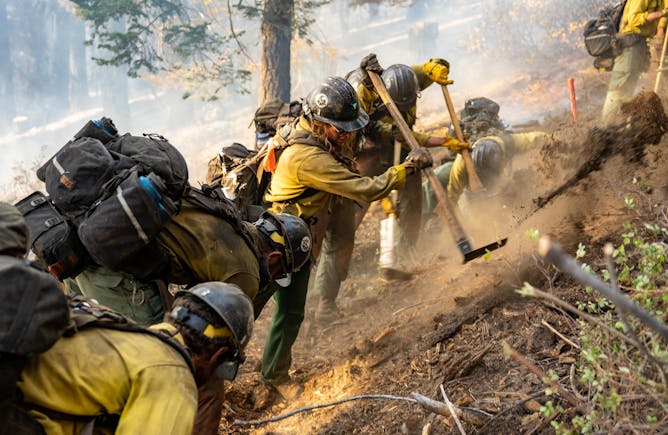|
The number of people who have been diagnosed with attention-deficit/hyperactivity disorder has been rising for decades, but prescriptions for medications spiked during the pandemic, contributing to shortages. Adult women showed the greatest increases in the use of stimulants like Adderall between 2020 and 2021. University of Washington psychiatric researcher Margaret Sibley evaluates how the pandemic may have affected the upward trend and explains some of the challenges of diagnosing adult ADHD.
Anyone who considers joining a Hotshot crew – the people sent to the hottest spots in wildfires – knows being very physically fit is an absolute requirement. University of Montana researcher Brent Ruby takes us to a fire camp in remote Montana where he is studying the incredible physical strains these firefighters face to understand their energy needs and to ultimately improve their health and safety. “Hotshot crews like this one are the elite workforce of the forest, and the demand on their bodies can rival that of the cyclists in the Tour de France,” he writes.
Who doesn’t love a science story about cats? Evolutionary biologist Jonathan Losos from Washington University in St. Louis writes there’s a clear ancestor to our pet felines – the African wildcat – and that more species of wild felines are about the size of a house cat. He explains how the emergence of agriculture created the conditions to, as the headline says, “finagle their way into human hearts and homes thousands of years ago.”
Also in this week’s science news:
If there’s a subject you’d like our team of science editors to investigate, please reply to this email.
|

During the height of the COVID-19 pandemic, social media was awash with promotions for ADHD as an explanation for people’s overwhelmed state of mind.
useng/iStock via Getty Images Plus
Margaret Sibley, University of Washington
The COVID-19 pandemic may have played a considerable role in the uptick of adults being treated for ADHD. But more data is needed to determine whether the trends will continue.
|

Ruby Mountain hotshots construct a fire line during the Dixie Fire in 2021.
Joe Bradshaw/BLM
Brent C. Ruby, University of Montana
Twenty-five years of research show what it takes to fuel wildland firefighters through an average day, and the toll the long seasonal work takes on their bodies.
|

Who run the world? Cats!
Grace Cary/Moment via Getty Images
Jonathan Losos, Arts & Sciences at Washington University in St. Louis
Natural selection changed just 13 genes to separate your Felix and Fluffy from their African wildcat ancestor.
|
|
|

Deion Scott Hawkins, Emerson College
Medical exploitation is an often overlooked part of Black history and partly explains the mistrust that members of the Black community have for the medical industry.
| |

Mary Philip, Vanderbilt University; Michael Rudloff, Vanderbilt University
T cells recognize and kill cancer cells but quickly lose their effectiveness. This fast dysfunction may help explain why immunotherapy doesn’t lead to long-term remission for many patients.
|

Barath Raghavan, University of Southern California; Michael Kantar, University of Hawaii
Conventional agriculture offers farmers few choices about which crops to grow or how to raise them. A new approach uses computing to construct better strategies with lower environmental impacts.
| |

Guido Roberts-Borsani, University of California, Los Angeles
The universe used to be filled with a hydrogen fog, before early stars and galaxies burned through the haze. Astronomers are studying galaxies that tell them about this period in the early universe.
|
|
|
|
|
-
Laura Y. Cabrera, Penn State
More invasive devices have prompted new debates about privacy and freedom. But it’s important to keep in mind that other technologies already sense and shape our thoughts, a neuroethicist argues.
-
Mark Geil, Kennesaw State University
Revisions to the CDC’s developmental milestone checklists removed crawling as a skill that babies pick up at a typical age. A biomedical engineer describes how more research may clarify its role.
-
Joshua S. Fu, University of Tennessee
Air quality forecasting is getting better, thanks in part to AI. That’s good, given the health impact of air pollution. An environmental engineer explains how systems warn of incoming smog or smoke.
-
Aaron W. Harrison, Austin College
Remember building model molecules with balls and sticks in chemistry class? You have J. Robert Oppenheimer to thank for that, as a quantum chemist explains.
|
|